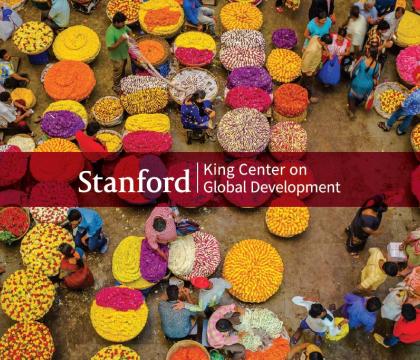Summer 2025 King Center Research Project "Implementing traditional and new technology to enhance science exploration in Madagascar"
The King Center on Global Development's Summer Undergraduate Full-Time Research Assistant Program offers opportunities for fieldwork and research experience to matriculated, Stanford, undergraduates interested in global poverty and development across all academic disciplines.
When Stanford University travel policies allow, selected students spend up to 12 weeks in a low- or middle-income country conducting full-time research for a King Center faculty affiliate. Each research assistant receives a stipend of approximately $8,000 that covers most associated costs including travel, lodging, and incidental expenses. Financial aid of up to $1,500 is also awarded to students who qualify.
Students are welcome to apply to multiple opportunities but must apply to each faculty research project separately. Students may only accept one project if they are offered multiple opportunities.
If you have problems submitting your application, please report issues through the SOLO platform with a screenshot that includes the URL and the full page. Please email kingcenter_programs@stanford.edu to also let us know of your issue(s).
RESEARCH PROJECT SUMMARY: Tracking health outcomes and body conditions in wildlife is often challenging due to limited funds and difficulty in capturing individuals. This project, led by graduate student Alexis Diaz, is a collaboration with the Ranomafana community and the Centre ValBio station in southeastern Madagascar, which has been tracking lemurs for the past 30 years. The aim is to monitor a sifaka population and collect dental health and body size metrics using both traditional and modern technologies. Traditional methods include dental casts to measure tooth growth or decay, while new methods involve the use of an intraoral scanner, commonly used in modern dentistry, to create 3D scans of the entire mouth. Additionally, an undergraduate intern will implement laser photogrammetry, a technique involving a laser monitor attached to a camera, to measure the body size of free-ranging sifakas and potentially track individual growth. The data collected will support a Ph.D. thesis exploring how changes in dental health and body size over time affect the population dynamics of a rare sifaka population.
Our students will train with the local team in these new methods, which will provide improved results while being cost-effective and resource efficient. Through this applied and computational research, we aim to implement innovative approaches that can advance local research capabilities and educational opportunities, fostering long-term conservation efforts in local communities that depend largely on low-resource wildlife exploration.
Research mentor: Professor Shripad Tuljapurkar, H&S - Biology Department, co-mentor Alexis Diaz, Ph.D. student
Dates: A minimum of ten weeks during summer quarter 2025.
WHAT YOU WILL DO: The RF will be required to work with Alexis Diaz, for 8 weeks in Madagascar at the Centre ValBio station. They will do the following:
- Stay in Centre ValBio station starting late June
- Collect body weight and morphometric estimates.
- Collect dental casts and intraoral scans.
- Ensure the safety of individual sifakas upon capture and release.
- Hike extreme trails to observe feeding patterns.
- Set-up laser photogrammetry and collect photos
- Work with the local team in adapting methods above
- Provide presentations in methods and results.
- Upon return, help process data collected.
- Stanford undergraduate students in good academic standing, and planning to return to Stanford in autumn 2025, are eligible to apply (co-terms in graduate tuition status are ineligible)
- Not currently doing an honors thesis or receiving funding from other sources during the summer
- Not working other summer jobs
- All majors are welcome
- Strong research and writing skills
- Must have good interpersonal skills and an ability to adapt well to cross-cultural contexts
In addition, specific qualification requirements:
- No requirements.
Time Commitment:
- All research assistants are required to work full time, i.e., 35-40 hours per week for a minimum of 10 weeks during the summer quarter. This should be your only commitment during this time period.
To Apply:
Along with the application, applicants are asked to submit a resume or CV, and a Stanford transcript.
Please also answer:
- What are your long-term professional goals upon graduation?
- Do you have experience with fieldwork and if so, what were some challenges?
- Please be aware that this requires travel to a rural community in southeastern Madagascar with limited accommodations and few health institutes nearby. Are you ok with distant travel, limited diet accommodations, and limited medical assistance during this time?
For questions regarding this opportunity, please contact:
